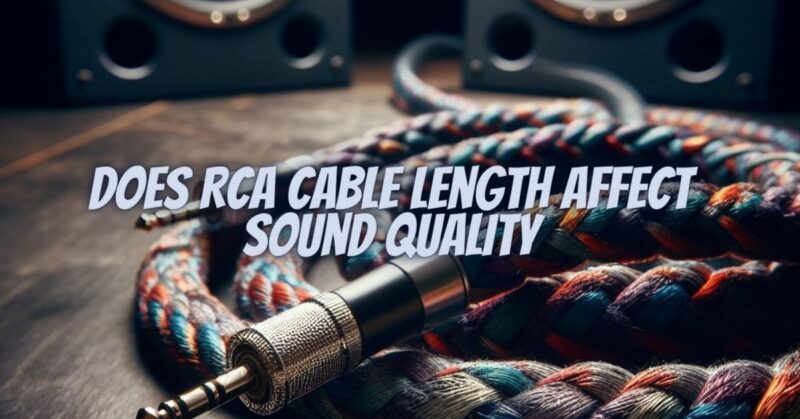RCA cables are a common sight in audio and video setups, connecting various components like CD players, turntables, amplifiers, and speakers. A frequently asked question among audio enthusiasts is whether the length of an RCA cable can impact sound quality. In this comprehensive article, we will explore the relationship between RCA cable length and sound quality, considering the key factors that contribute to audio performance.
Understanding RCA Cables
RCA cables, also known as phono cables or audio cables, are analog cables designed for transmitting audio and video signals. They typically feature red and white connectors (or red and black) and are widely used to interconnect audio and video components in home theaters, music systems, and other audiovisual setups. RCA cables transmit analog signals, making them suitable for various audio applications.
Factors Influencing Sound Quality
Several essential factors influence the sound quality when RCA cables are involved in audio setups:
- Cable Quality: The quality of the RCA cable itself significantly impacts sound fidelity. High-quality cables are constructed with quality conductive materials, proper insulation, and shielding to minimize interference and signal loss.
- Connector Quality: The connectors at both ends of the RCA cable should provide secure, low-resistance connections. Poorly constructed connectors or corroded connectors can introduce noise and signal degradation.
- Cable Length: The length of the RCA cable can potentially affect sound quality due to resistance, capacitance, and inductance effects.
- Interference and Noise: External interference from electrical devices, electromagnetic fields, or radio frequency interference (RFI) can impact sound quality. High-quality cables with proper shielding are more effective at reducing interference.
Does RCA Cable Length Affect Sound Quality?
The impact of RCA cable length on sound quality can vary based on several factors:
- Short Cables (3-6 feet): For most standard applications, where RCA cables are relatively short, typically between 3 to 6 feet (1-2 meters), the impact of cable length on sound quality is negligible. Even standard-quality RCA cables perform well in this range.
- Moderate Length Cables (6-12 feet): When using RCA cables with lengths between 6 to 12 feet (2-4 meters), the resistance, capacitance, and inductance of the cable may introduce minor signal loss and high-frequency roll-off. However, these effects are usually subtle and often go unnoticed by the average listener.
- Long Cables (12+ feet): With RCA cables longer than 12 feet (4 meters), there is a more noticeable potential for signal loss and high-frequency attenuation. Longer cables can result in reduced audio clarity and a subtle reduction in sound quality, especially when using lower-quality or unshielded cables.
Minimizing Sound Quality Impact
To mitigate the potential impact of RCA cable length on sound quality, consider the following tips:
- Use High-Quality Cables: Invest in high-quality RCA cables with good shielding, quality connectors, and low-resistance conductors to minimize signal loss and interference.
- Keep Cable Length Short: Whenever possible, opt for shorter RCA cables to maintain optimal sound quality, especially in critical listening environments.
- Properly Store and Maintain Cables: Store RCA cables coiled or neatly organized to prevent kinks or damage to the connectors, which can affect sound quality.
- Check for Interference: Be mindful of sources of interference, such as electronic devices or wireless signals, which can affect audio quality regardless of cable length.
In conclusion, while RCA cable length can potentially have a subtle impact on sound quality, its effect is often minimal in typical usage scenarios. Short to moderate-length RCA cables, especially those of high quality, generally provide excellent audio fidelity. Longer RCA cables may introduce subtle signal loss and high-frequency attenuation, but these effects are typically not noticeable to the average listener. To maintain the best possible sound quality, prioritize high-quality cables, proper cable maintenance, and attention to potential sources of interference. Ultimately, other factors such as the quality of your audio source, playback equipment, and the acoustic environment play a more substantial role in overall sound quality than the length of your RCA cables.

